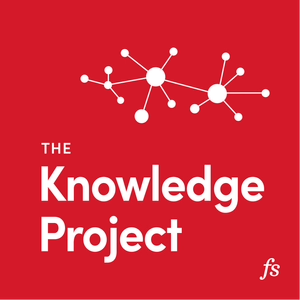
Tariq Fancy asks Is Sustainable Investing Dangerous?
10/12/21 • 45 min
This episode of the Portico Podcast features a conversation with Tariq Fancy — the former CIO for Sustainable Investing at the ~$10 trillion asset manager BlackRock.
He’s also the author of the delightfully thought-provoking essay The Secret Diary of a ‘Sustainable Investor’.
I reached out to Tariq after reading his essay because it raises some uncomfortable truths about the explosion of ESG-related products across public and private markets.
While I agreed strongly with his writing about the nonsense of ESG-related investments in stock and bond markets, I maintained that sustainable- or impact-focused investors in private markets could drive meaningful change.
I also wanted to think through whether the so-called ‘greenwashing’ effect changes with scale.
I know managers whose investments are driving positive environmental and social change in some of the most underserved markets — indeed, some have been featured on the Portico Podcast.
And honestly, I worry that the asset-gathering activities of large-cap firms will not only crowd out the earnest players trying to increase human dignity, but also tarnish the idea that private markets investing can be a positive-sum enterprise.
I also worry about the proliferation of service providers bilking people with asinine accounting and compliance solutions — a phenomenon that famed corporate finance professor Aswath Damodaran refers to as the ESG Gravy Train.
I remember reading an article in the FT over the summer about PwC looking to hire 100,000 people to provide ESG advice and thought the madness must stop — we’re creating entire categories of jobs that inhibit the flow of capital to productive users of financing.
And we all know that scale providers can absorb these costs, thereby entrenching their market position and reducing competition from new entrants and smaller firms.
So, you can see why I was keen to speak with Tariq about these issues, as well as the roles the public and private sectors can play in solving the structural environmental and social challenges of climate change and inequality.
But we also talk about Tariq’s nonprofit, Rumie, which should resonate with listeners of the podcast.
Rumie provides free digital education to learners in over 176 countries, including Afghanistan where one of their big initiatives is to create more content in Dari and Pashto so that women and girls can continue their education despite the return of the Taliban.
I’d encourage listeners to visit Rumie’s website. And, if you’re a fund manager or institutional investor who’s interested in supporting the growth of a nonprofit in the edtech space, reach out to Tariq and say hello.
This podcast was recorded in October 2021.
Read The Secret Diary of a ‘Sustainable Investor’.
Learn about Rumie and sample some of its bite-sized lessons.
Donate to support Rumie’s mission.
Follow Tariq on Twitter.
Read Aswath Damodaran’s post on The ESG Movement: The “Goodness” Gravy Train Rolls On!
This episode of the Portico Podcast features a conversation with Tariq Fancy — the former CIO for Sustainable Investing at the ~$10 trillion asset manager BlackRock.
He’s also the author of the delightfully thought-provoking essay The Secret Diary of a ‘Sustainable Investor’.
I reached out to Tariq after reading his essay because it raises some uncomfortable truths about the explosion of ESG-related products across public and private markets.
While I agreed strongly with his writing about the nonsense of ESG-related investments in stock and bond markets, I maintained that sustainable- or impact-focused investors in private markets could drive meaningful change.
I also wanted to think through whether the so-called ‘greenwashing’ effect changes with scale.
I know managers whose investments are driving positive environmental and social change in some of the most underserved markets — indeed, some have been featured on the Portico Podcast.
And honestly, I worry that the asset-gathering activities of large-cap firms will not only crowd out the earnest players trying to increase human dignity, but also tarnish the idea that private markets investing can be a positive-sum enterprise.
I also worry about the proliferation of service providers bilking people with asinine accounting and compliance solutions — a phenomenon that famed corporate finance professor Aswath Damodaran refers to as the ESG Gravy Train.
I remember reading an article in the FT over the summer about PwC looking to hire 100,000 people to provide ESG advice and thought the madness must stop — we’re creating entire categories of jobs that inhibit the flow of capital to productive users of financing.
And we all know that scale providers can absorb these costs, thereby entrenching their market position and reducing competition from new entrants and smaller firms.
So, you can see why I was keen to speak with Tariq about these issues, as well as the roles the public and private sectors can play in solving the structural environmental and social challenges of climate change and inequality.
But we also talk about Tariq’s nonprofit, Rumie, which should resonate with listeners of the podcast.
Rumie provides free digital education to learners in over 176 countries, including Afghanistan where one of their big initiatives is to create more content in Dari and Pashto so that women and girls can continue their education despite the return of the Taliban.
I’d encourage listeners to visit Rumie’s website. And, if you’re a fund manager or institutional investor who’s interested in supporting the growth of a nonprofit in the edtech space, reach out to Tariq and say hello.
This podcast was recorded in October 2021.
Read The Secret Diary of a ‘Sustainable Investor’.
Learn about Rumie and sample some of its bite-sized lessons.
Donate to support Rumie’s mission.
Follow Tariq on Twitter.
Read Aswath Damodaran’s post on The ESG Movement: The “Goodness” Gravy Train Rolls On!
Previous Episode

Simon Clark on The Key Man
This episode features an interview with Simon Clark, a reporter at The Wall Street Journal and the co-author of The Key Man — the summer’s must-read book about Arif Naqvi and the downfall of The Abraaj Group.
Most listeners and followers of Portico will be familiar with the background of the Abraaj story. But if you’re not, I’d recommend that you go back and listen to Episode 8.
But even more, I’d recommend you purchase a copy of The Key Man for yourself (USA, UK). It’s an absolutely riveting book; it has the pace of John Carreyrou’s Bad Blood, but with an unbelievable cast of credulous characters who fell for a fantasy.
In today’s conversation, Simon and I discuss:
- The origins of Abraaj, some of its early transactions, and the oft-asked question: where did they get their money?
- Abraaj’s acquisition of Aureos and how it unlocked the firm’s ability to scale.
- The manufacture of social capital — the people and firms who testified to the greatness of Arif and Abraaj, seemingly without conducting an ounce of due diligence.
- The Karachi Electric deal.
- The $6B mega-fund.
- The promise of impact investing.
- The necessity of greater transparency in private equity.
- And much more.
I had four pages of questions for Simon, so we clearly didn’t get to everything on my list — and candidly some of the unasked questions may be better over a pint.
But do yourself a favor and grab a copy of the book.
I hope you enjoy the conversation.
This podcast was recorded in July 2021.
Follow Simon on Twitter.
Next Episode

Gopal Jain on India’s Transformation
In today’s episode I speak with Gopal Jain, co-founder and Managing Partner of Gaja Capital, one of the leading private equity firms in India.
It was a real pleasure to speak with Gopal because he’s lived through the boom-and-bust cycles within India’s private equity industry, so he’s able to place today’s environment in context, and impart some of the hard-earned lessons he’s gleaned over the last two decades.
Gopal and I cover a lot of territory in this conversation, so I’ll spare you the rundown of topics. But I’ve been marinating on two of the things that Gopal said since our conversation.
The first is that a couple decades ago, upwards of 80% of India’s most talented engineers and entrepreneurs were migrating to the United States; whereas today, most are choosing to launch startups within India, with the benefit of a robust private markets supply chain of capital at-the-ready.
The second is that Gopal thinks that India’s PE industry could grow from $50 billion in deals to $100 billion over the next five to 10 years. And if that happens, he thinks India could detach from the EM complex and become a standalone market like China.
I was also really enamored with Gopal’s “5+1” construct for explaining the foundational infrastructure that is accelerating India’s digital transformation.
One of the things we didn’t talk about — but I think you should know about — is the Gaja Capital Business Book Prize, which has some great suggestions to add to your bookshelves. I’ll be adding a few volumes to mine.
My audio came out a bit odd in places, so I apologize if it’s a bit distracting. The good news is I don’t speak much.
There’s so much food for thought in this episode that I don’t want to keep you waiting any longer.
With that, I hope you enjoy my conversation with Gopal Jain.
This podcast was recorded in November 2021.
Learn more about Gaja Capital and its Business Book Prize.
Follow Gaja Capital on Twitter.
Bain & Company, India Private Equity Report 2021.
Bain & Company, India Venture Capital Report 2021.
If you like this episode you’ll love
Episode Comments
Generate a badge
Get a badge for your website that links back to this episode
<a href="https://goodpods.com/podcasts/the-portico-podcast-224469/tariq-fancy-asks-is-sustainable-investing-dangerous-25508467"> <img src="https://storage.googleapis.com/goodpods-images-bucket/badges/generic-badge-1.svg" alt="listen to tariq fancy asks is sustainable investing dangerous? on goodpods" style="width: 225px" /> </a>
Copy




